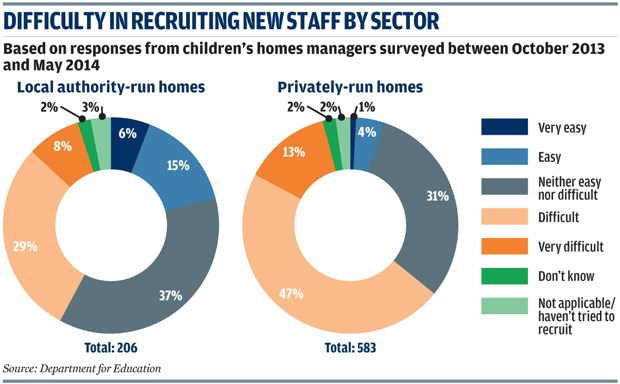Research Report: A Census of the Children's Homes Workforce
Charlotte Goddard
Tuesday, February 17, 2015
Authors: Alex Thornton, Sarah Hingley, Ed Mortimer, TNS BMRB
Published by: Department for Education, January 2015
SUMMARY
This research, which is being used to inform the Department for Education's children's home reform programme, was the first of its kind. The researchers aimed to gather detailed information about the qualifications of staff in children's homes, including whether staff met statutory qualification requirements, pay, training and continuous professional development in the sector.
In total 841 children's homes took part in the survey, which took place between October 2013 and May 2014, comprising just under half – 49 per cent – of all children's homes in England. The sample excluded secure homes and homes that were also registered as schools.
The researchers found the average number of staff in a children's home was 12, but that the figures varied from one to 95. They estimate just over 20,000 people are employed in children's homes across the country.
Most staff – 99 per cent – were paid over the national minimum wage, which was £6.31 at the time of the census. However, 11 per cent of staff were paid less than the living wage rate – £7.65 outside London and £8.80 in London at the time of the survey. Overall, managers and supervisors were paid on average £12.96 per hour and non-managerial staff £9.65 per hour. However staff in privately- run homes were paid on average less than those in local authority-run homes.
All staff who were paid below the minimum wage or living wage worked for privately-run firms. No managers at local authority-run homes reported their staff were paid below the minimum or living wage. London-based staff were the most likely to be low paid, with 27 per cent of all staff in the region being paid below the living wage.
More than nine in 10 - 92 per cent - of children's home staff, excluding registered managers, either held a Level 3 qualification or were working towards the Level 3 Diploma. Around nine in 10 managers - 89 per cent - either held the Level 5 or equivalent Level 4 NVQ qualification or were working towards the Level 5 Diploma.
Three quarters of all homes had a budget for continuing professional development (CPD), and 93 per cent had CPD in place for their staff. Managers said a wide range of training was available to staff, with 83 per cent of homes offering to release staff for external training, 79 per cent saying they bring in external trainers to the home and 80 per cent offering internal training.
Recruitment was a concern for children's homes, with more than half of all managers - 54 per cent - reporting difficulties in recruiting staff with the appropriate level of skills and training. Perceptions of the difficulty of recruiting varied quite substantially between managers of local authority-run and privately-run homes. Only around a third - 37 per cent - of managers in local authority-run homes indicated recruitment was difficult compared with 60 per cent of those in privately-run homes.
IMPLICATIONS FOR PRACTICE
One of the major findings of the survey was the difficulty across the board in recruiting suitable staff. Of the 54 per cent of children's home mangers that reported difficulties, 91 per cent cited a lack of relevant experience among applicants and 52 per cent reported applicants did not have the necessary qualifications. Raising the profile, status and pay of staff who work in children's residential care is clearly a priority, say the researchers. One way forward could be the development of a qualification for the sector that is both well-regarded and widely- recognised, and the establishment of an independent body to provide guidance, support and to quality assure the content and delivery of any training.
FURTHER READING
- Children's Homes: Understanding the Market and the Use of Out of Authority Placements, Emily R Munro, Sam McDermid, Katie Hollingworth and Claire Cameron, Childhood Wellbeing Research Centre, January 2014. A report exploring the children's residential care market and local authority commissioning and procurement strategies.
- Management, Leadership and Resources in Children's Homes: What Influences Outcomes in Residential Child-Care Settings? Leslie Hicks, Ian Gibbs, Helen Weatherly, Sarah Byford, University of York, The British Journal of Social Work, 2009. A paper examining internal management and use of resources across 45 children's homes in England.
- Training and Developing Staff in Children's Homes, Clarissa White, Jennifer Gibb and Berni Graham, National Children's Bureau Research Centre, Alex Thornton, Sarah Hingley and Ed Mortimer, TNS BMRB, for the Department for Education, January 2015. Research carried out to understand the qualifications, skills and training required to meet the needs of young people in children's homes.





